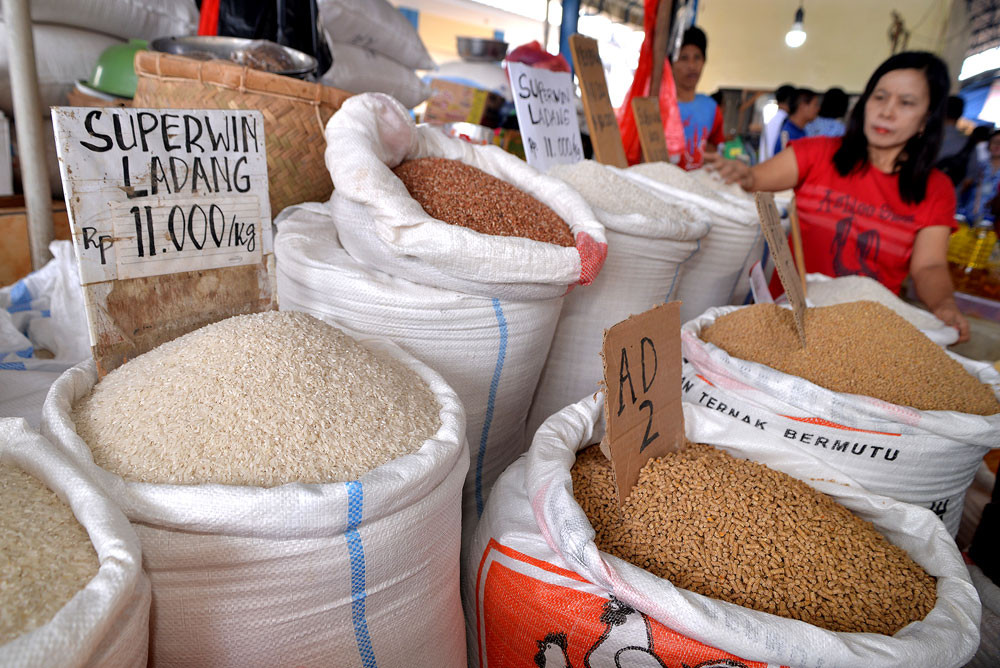Popular Reads
Top Results
Can't find what you're looking for?
View all search resultsPopular Reads
Top Results
Can't find what you're looking for?
View all search resultsEnsuring food security in Indonesia during COVID-19
The COVID-19 epidemic necessitates the adoption of specific measures along the supply chain to ensure the availability, distribution and safety of food.
Change text size
Gift Premium Articles
to Anyone
F
ood security is being widely discussed as a consequence of the increasingly widespread impacts of the COVID-19 pandemic. As food is a basic need, food supplies is one of the critical issues that need to be addressed immediately.
In the midst of the Indonesian outbreak, the government's appeal to the public to work from home and maintain physical distance, as well as the several local governments that have implemented the large-scale social restrictions (PSBB), have made significant changes in almost all aspects of life. These include changes to the food supply chain from production to consumption.
Farmers and other food producers are beginning to experience changes in the supply chain. They have also had to adjust their production processes to ensure food quality and safety during the epidemic, especially in affected areas. Logistics and distribution are also undergoing some adjustments in terms of supplying modern markets and online markets.
Meanwhile, in terms of consumption, modes of transaction have also started to change, as indicated by the increasing number of transactions using digital or online platforms. This condition ultimately requires an adjustment to strategies in food policy across the entire supply chain to ensure food security in Indonesia.
Almost all countries are trying to meet their domestic food needs due to the disruptions to international trade since COVID-19 started to spread around the world. Priority should be given to facilities that support food production, such as subsidies for agricultural machinery and equipment, fertilizers and seed. This is an extremely urgent need, since 93 percent of Indonesia's farmers are smallholders.
A production protocol is also needed to ensure food quality and safety during the epidemic. The Agriculture Ministry and regional agriculture offices should therefore guarantee that all production support facilities and assistance are delivered effectively. They must also supervise the implementation of food production protocols to stop the spread of COVID-19.
The ministry's data shows that the supplies of some basic food commodities, such as rice and corn, are likely sufficient to cover the next three to four months. But the supplies of other food commodities like garlic and beef are low. Hence, importing these goods are urgent and imperative, especially during Ramadan and Idul Fitri when the demand is at its peak. Good coordination on imports is necessary between the trade and agriculture ministries as well as the State Logistics Agency (Bulog).
Logistics and distribution has a very strategic role to fulfill during the viral outbreak, especially in terms of adhering to the COVID-19 policies and meeting domestic needs, especially in food and food-related needs. The importation of food commodities needs attention before the distribution of these commodities across the country.
Logistics and distribution is closely linked to the mobilization of relevant logistics service providers along the supply chain, from shipping and warehousing, as well as from the starting point to the endpoint that involves producers, distributors, retailers and consumers.
The COVID-19 mitigation plan must consider distribution channels, which involves physical interaction between businesses and intermediaries. Quarantine areas that have imposed restrictions on physical interaction and the movement of people must give an exception to logistics and distribution.
Primary commodities like food must adopt particular handling and other procedures that are different than usual. Different logistics and distribution procedures must be adopted for food compared to other commodities because the durability and sterility of food must be maintained until they reach their final destination.
One procedure that must be adopted in logistics and distribution is the decontamination of all commodities, workers, and equipment. Standard personal protective equipment (PPE) such as masks, gloves, sterile suits and hand sanitizers must be used not just by medical personnel but also by logistics and distribution workers.
The readiness of logistics and distribution workers and vehicles becomes important when workers must undergo health screening, while both the interior and exterior of logistics vehicles must be decontaminated using disinfectant. Freight terminals must also be decontaminated.
Taking into account Indonesia's geography, population distribution and the increasingly inelastic demand for food during the epidemic, the supply system and distribution infrastructure must be highly efficient.
In conclusion, the availability of food supplies and the stability of food prices are crucial, especially over the next two months.
While the next harvest season occurs in May-June, the government still needs to ensure the smooth distribution of food throughout the country. In addition, it must also ensure that all supporting facilities and assistance are delivered effectively according to the established procedures across the entire food supply chain from production to consumption.
***
Fajar B. Hirawan is an economics researcher at the Centre for Strategic and International Studies Indonesia; Akita A. Verselita is a cofounder of the Consortium for Southeast Asian Studies in Asia (SEASIA). The views expressed are their own










